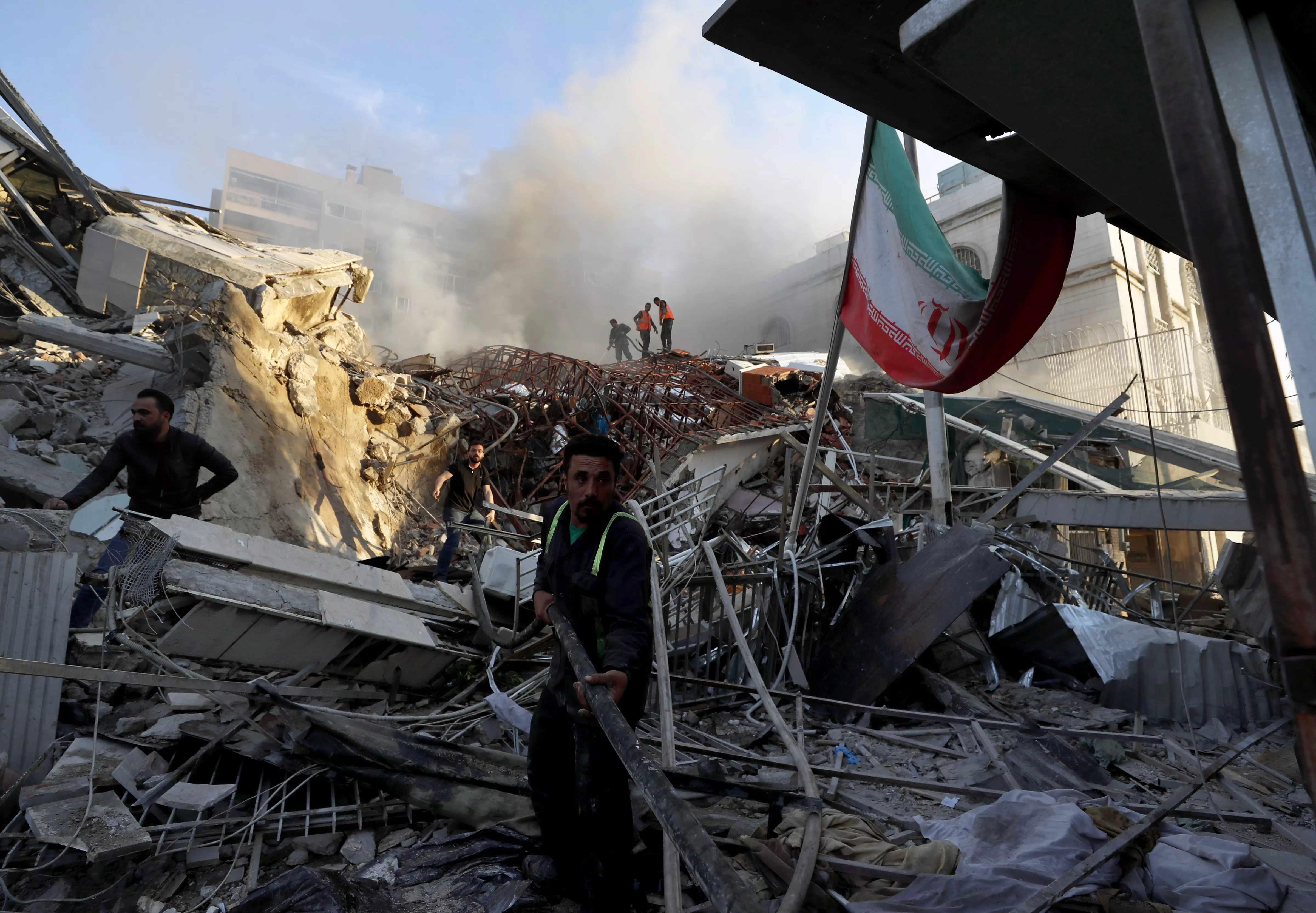
Israel airstrike on Iran embassy puts US at risk as Tehran reiterates threat
Multiple arms of Iran’s government have served notice that they would hold the US, Israel’s all-weather friend, accountable for the attack

Shortly after an airstrike widely attributed to Israel destroyed an Iranian consulate building in Syria, the United States had an urgent message for Iran: We had nothing to do with it.
But that may not be enough for the US to avoid retaliation targeting its forces in the region. A top US commander warned on Wednesday (April 3) of danger to American troops.
And if Israeli Prime Minister Benjamin Netanyahu’s recent broadening of targeted strikes on adversaries around the region to include Iranian security operatives and leaders deepens regional hostilities, analysts say, it’s not clear the United States can avoid being pulled into deeper regional conflict as well.
Iran’s warning
By attacking the Iranian diplomatic station, Israel’s apparent escalation has raised fears that the devastating six-month war against Hamas could spill over into the entire Mideast region and beyond.
Iranian leaders renewed their promises to hit back after an airstrike widely blamed on Israel destroyed Iran’s Consulate in Syria, killing 12 people, including two elite Iranian generals.
Supreme Leader Ayatollah Ali Khamenei said Israel will continue to fail on the battlefield in Gaza, and its defeats will bring it closer to collapse.
“Desperate efforts like the act they committed in Syria will not save them from defeat and they will be slapped for the action, too,” Khamenei was quoted as saying by the official IRNA news agency, during a meeting with officials Wednesday.
Iran’s President Ebrahim Raisi said Wednesday the attack “will not remain without answer.” The US is concerned the deadly strike in Damascus could trigger new attacks on American troops by Iranian-backed militias in Iraq and Syria, said Lt. Gen. Alexus Grynkewich, the top US Air Force commander for the Middle East.
Israel’s growing isolation
Iran and its allies — including the Lebanese militant group Hezbollah and other armed groups in Syria, Iraq and Yemen — have repeatedly traded fire with Israel and the US since the start of Israel’s war in Gaza.
Israel faces growing isolation as international criticism mounts over its killing of six foreign aid workers this week who were helping deliver desperately needed food in Gaza. The United Nations says much of the population in northern Gaza is on the brink of starvation.
Israeli society has grown increasingly divided in recent months as the war in Gaza has dragged on and the government has struggled to return dozens of hostages held captive by Hamas.
This week, families of the hostages joined a broader protest movement seeking Netanyahu’s resignation and new elections. Protests this week near Netanyahu’s residence turned violent with clashes between demonstrators and police.
Israel responsible for strike: US
The Biden administration insists it had no advance knowledge of the airstrike on Monday. But the United States is closely tied to Israel’s military regardless.
The US remains Israel’s indispensable ally and unstinting supplier of weapons, responsible for some 70% of Israeli weapon imports and an estimated 15% of Israel’s defence budget. That includes providing the kind of advanced aircraft and munitions that appear to have been employed in the attack.
Israel hasn’t acknowledged a role in the airstrike, but Pentagon spokeswoman Sabrina Singh said Tuesday that the US has assessed Israel was responsible.
Threat to US
Multiple arms of Iran’s government served notice that they would hold the United States accountable for the fiery attack. The strike, in the Syrian capital of Damascus, killed senior commanders of Iran’s Islamic Revolutionary Guard Corps for Syria and Lebanon, an officer of the powerful Iran-allied Hezbollah militia in Lebanon, and others.
American forces in Syria and Iraq already are frequent targets when Iran and its regional allies seek retaliation for strikes by Israelis, notes Charles Lister, the Syria program director for the Middle East Institute.
“What the Iranians have always done for years when they have felt most aggressively targeted by Israel is not to hit back at Israelis, but Americans,” seeing them as soft targets in the region, Lister said.
Risk to US forces
On Wednesday in Washington, the top US Air Force commander for the Middle East, Lt Gen Alexus Grynkewich, said Iran’s assertion that the US bears responsibility for Israeli actions could bring an end to a pause in militia attacks on US forces that has lasted since early February.
He said he sees no specific threat to US troops right now, but “I am concerned because of the Iranian rhetoric talking about the US, that there could be a risk to our forces”.
US officials have recorded more than 150 attacks by Iran-backed militias in Iraq and Syria on US forces at bases in those countries since war between Hamas and Israel began on October 7 last year.
Grynkewich told reporters the US is watching and listening carefully to what Iran is saying and doing to evaluate how Tehran might respond.
US engagement in war
The US military already has deepened engagement from the Mediterranean to the Red Sea since the Hamas-Israel war opened — deploying aircraft carriers to the region to discourage rear-guard attacks against Israel, opening airstrikes to quell attacks on shipping by Iran-allied Houthis in Yemen.
It is also moving to build a pier off Gaza to try to get more aid to Palestinian civilians despite obstacles that include Israel's restrictions and attacks on aid deliveries.
(With agency inputs)

